COUNTYWIDE : Melted Tires to Be Used in Paving Job
- Share via
The recycling wave hit county streets Tuesday, as the Board of Supervisors approved a $149,000 project for using melted tire rubber to repave roads.
“I think it’s the wave of the future,” said Orange County Supervisor Gaddi H. Vasquez. “This beats just dumping (old tires) in landfills or selling them.”
The rubber asphalt process has been around for about a decade and put to use by the state in Northern California and other areas. But it has only been tried once before by the county, on Toledo Way in the Irvine area about a year ago, officials said.
“It’s something relatively new for us,” said Don Bourgeois, a county materials engineer. “We consider it experimental, and we’re trying it out on some small- to medium-size jobs.”
The county on Tuesday approved the use of 4,300 tons of rubber asphalt to repave a six-lane, 4,000-foot stretch of Lake Forest Drive between Rockfield Boulevard and Overlake Drive in the Lake Forest area.
That stretch of Lake Forest Drive has deteriorated more quickly than county engineers predicted because of heavy traffic and irrigation runoff.
County officials hope that the new process, while more expensive than traditional paving, will do a better job of resisting water damage and will last twice as long, perhaps for more than 15 years.
As an estimated several billion used tires have sat in dumps nationwide, there has been growing environmental concern about the problem.
But Bourgeois said county staff members proposed the new process because of its potential for better wear, not because of its ecological advantages.
“But if that can be a byproduct, so much the better,” he said.
While some opponents of the process have raised questions about possible toxics released by the tire-melting process, county officials said they are confident it is safe.
But Paul Cleary, president of the R.J. Noble Co. in Orange, which holds a $2.1-million repaving contract with the county, isn’t so convinced. As directed by the county, his firm gets the rubber asphalt from a Los Angeles supplier and mixes it with asphalt and gravel in its Orange plant to make the repaving mix for local roads.
“I don’t know what’s in ground-up tires, and I don’t know if anybody else does,” he said. “People are looking to us to get rid (of old tires), and I don’t want the responsibility. I don’t know the long-range effects” of the process as far as health risks or quality of the product, he said.
“And it’s sort of a pain, frankly. (The process) slows down our production, and it smells like the devil,” he said.
More to Read
Sign up for Essential California
The most important California stories and recommendations in your inbox every morning.
You may occasionally receive promotional content from the Los Angeles Times.













